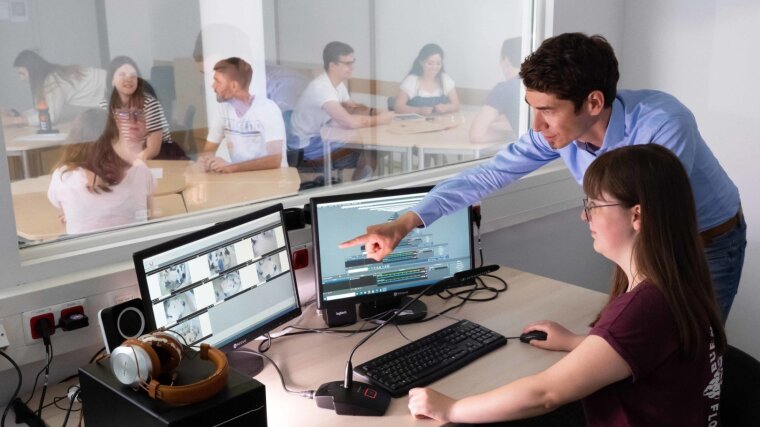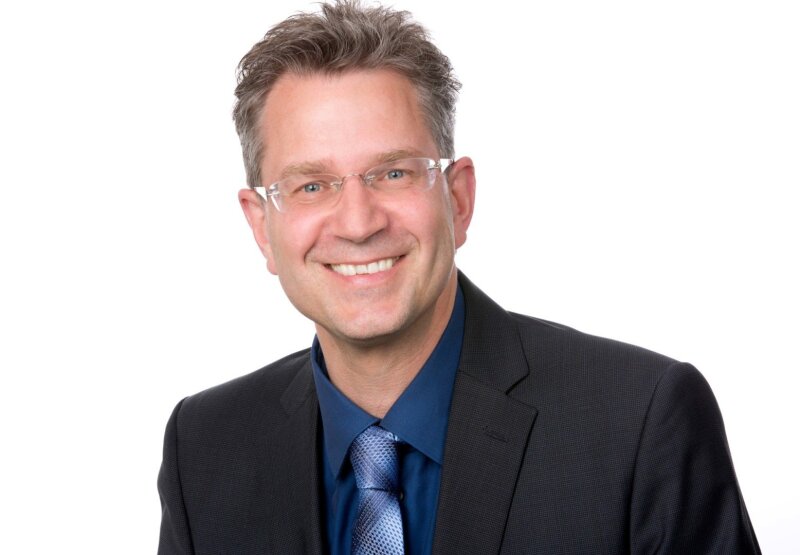
- Research
- Awards and Personnel
- Studies and Teaching
- Knowledge Transfer and Innovation
Published: | By: Sebastian Hollstein
There is one room that is fundamental to teaching the natural sciences to university students as well as school pupils: the laboratory. But chemistry or physics are not the only subjects in which course content has to be demonstrated, new knowledge applied and findings obtained through practical testing. It is also helpful for both trainee and experienced teachers to try things out in an experimental space, whether they teach biology or history. For these reasons, educational scientists at Friedrich Schiller University Jena have now set up the “Learning to Teach-Lab:Science”. This teaching and learning lab – the first educational science lab in Germany for secondary schools – will be opened on 1 June on the occasion of the “Herbart-Professur für Lehrer:innenbildung der Jenaer Qualitätsoffensive Lehrerbildung” (Herbart Professorship for Teacher Training of the Jena Quality Initiative for Teacher Training).
“Together with colleagues from the various subjects, we have designed a place where trial lessons can be held and educational science content can be placed in a subject-related learning context,” explains Prof. Alexander Gröschner, education researcher at the University of Jena, who heads the laboratory. “This is quite common for primary schools, but something completely new for secondary schools, although just as important.”
How does small-group group work function best?
In the lab, various permanently installed and mobile cameras, as well as microphones at each table, record every aspect of teaching, teacher-student and student-student interaction so that it can be evaluated afterwards. In addition, a lesson in the lab can be observed live behind a mirrored screen and even influenced by a in-ear microphone, for example through instructions being given to the teacher. “We are primarily interested in the micro-perspective on school lessons,” says Gröschner. “Small-group work, for example, has become a common tool, but many parameters often go unnoticed. What is the optimum composition of such a group? How do the pupils collaborate? Who takes on which role? How should a task be instructed so as to encourage purposeful interaction? These are the questions we want to investigate.”
Bridge between university and school
The new laboratory will primarily fulfil three tasks. First, it will help trainee teachers to simulate lessons during their studies, to try things out and, for example, to interact correctly with pupils. Second, teachers in employment can use the laboratory as a centre for professional training, for example to hold a lesson with a school class and evaluate it afterwards with experts. Interested teachers can already register to do this. Third, the experts at the University of Jena actively carry out classroom research themselves through on-site experiments.
“We want to prepare our students as comprehensively as possible for their later employment in schools, and such an experimental space where they can try things out is perfect for this,” says Gröschner. “And at the same time, it gives us the opportunity to further improve the training of future teachers in general – which ultimately benefits society as a whole.” Such practice-oriented training ensures that students can also apply what they have learned in the classroom. “In this way, we build an important bridge between science and practice, between university and school.”
Herbart professorship
It is no coincidence that the opening of the new lab is being celebrated with the “Herbart Professorship for Teacher Training of the Jena Quality Initiative for Teacher Training”. Because this year, Prof. Frank Lipowsky, an educational scientist from Kassel, is taking on the visiting professorship.
“We are pleased to welcome him as one of the most renowned experts on school and educational research in Germany,” says Alexander Gröschner, whose department is hosting the professorship and the associated programme this year. “He is probably the most renowned German scientist in the field of further and continuing education, and spokesperson for the Quality Offensive in Teacher Training at the University of Kassel.”
Lipowsky will also support Jena’s educational scientists with his external perspective in evaluating the project “Professionalisierung von Anfang an” (Professionalisation from the Start) in the Jena Model of Teacher Training (PROFJL²), which will come to an end next year, and in using it to develop sustainability initiatives. In his keynote lecture on the occasion of the Herbart Professorship, he will devote himself to the topic “Why it can sometimes be helpful to make learning harder – cognitive activation and the power of comparison” (German only). Interested members of the public are invited to attend at 6 p.m. on 1 June, in the Rosensäle (Rose Rooms) of the University of Jena (Fürstengraben 27).
The Kassel educationalist Prof. Dr Frank Lipowsky holds the Herbart Professorship 2022.
Image: Sonja Rode